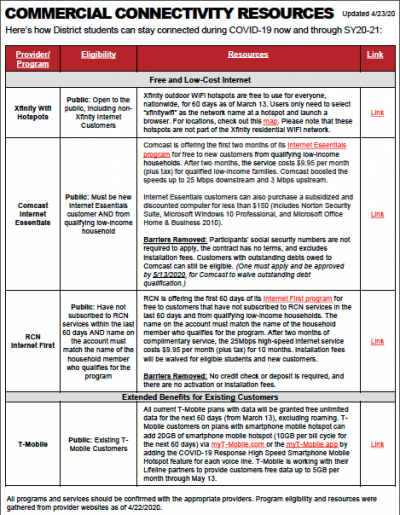Unprecedented Times, Unprecedented Authorizing: Continuity in the Midst of the Digital Divide: Navigating Device Procurement and Internet Access
The abrupt shift to distance learning, triggered by COVID-19, further exposed inequities facing millions of students nationwide. In the District of Columbia, the story is no different.
The digital divide – the gap between people with functional access to digital and information technologies and those with little to no access at all – is disproportionately impacting at-risk students. Given that a student is deemed at-risk if they qualify for the Temporary Assistance for Needy Families program or the Supplemental Nutrition Assistance Program; were identified as homeless or in foster care; or are high school students at least one year older than the expected age for their grade, one thing is clear: lack of access is particularly challenging for students most at risk of academic failure.
In response to Mayor Muriel Bowser’s declaration of a state of emergency in the District, on March 11, 2020, DC Public Charter Schools moved swiftly to ensure students continue to learn while at home. Nearly every public charter school prioritized an assessment of technology device needs within their respective school communities, in conjunction with an assessment of on-hand inventory. While some public charter schools – such as KIPP DC, Ingenuity Prep PCS, and Washington Leadership Academy PCS – maintained a 1:1 student-to-Chromebook ratio, prior to COVID-19, several other public charter schools found themselves in unchartered territory, working urgently to secure laptops for students in need.
However, the digital divide is one that extends to connectivity in addition to a lack of access to a laptop. Shortly after school buildings closed and laptops were distributed, public charter school leaders collectively identified an urgent need to supply students with hotspots all across the city. Whereas some students reported a complete lack of access to the internet, others reported issues pertaining to weak connectivity, insufficient to meet the needs of a live classroom session on Zoom, for example.
To support public charter school leaders, DC Public Charter School Board Executive Director Scott Pearson facilitated a $250,000 purchase of 1,600 T-Mobile hotspots for students who lacked WiFi, in late-March.
Citywide, Mayor Bowser announced a $1 million fund to help close the digital divide for students in public and public charter schools across the District. The DC Education Equity Fund, in partnership with Education Forward DC and the DC Public Education Fund, is designed to get District students access to devices and internet access amid COVID-19. Additionally, funds will be set aside to establish a citywide tech support call center for students, families, and teachers.
As public charter school students embark on their fifth week of the new normal (i.e, distance learning at home), public charter school leaders continue to evaluate and tweak all aspects of curriculum, instruction, and support to meet the needs of students better.
Given that the school year is ending early, public charter schools have shifted their focus to developing streamlined tech support systems to address inevitable issues such as device repair and looking ahead to the summer learning. As an organization, the DC Public Charter School Board will continue to prioritize the facilitation of best practice sharing within the sector via weekly webinar offerings. Regardless of the circumstances, we continue to remain laser-focused on our goal of ensuring that students and families in Washington, DC have access to a quality charter school education.
Learn more about connectivity in the District by clicking on the following links:
“Connectivity in DC: Bridging the Digital Divide” - A DC PCSB Webinar
Public Connectivity Resources
Here's how residents in the District can stay connected during the COVID-19 outbreak:
